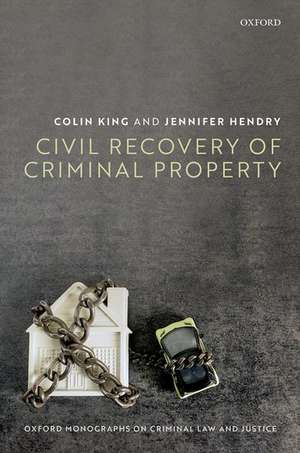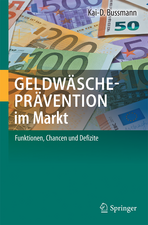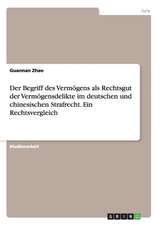Civil Recovery of Criminal Property: Oxford Monographs on Criminal Law and Justice
Autor Colin King, Jennifer Hendryen Limba Engleză Hardback – 17 aug 2023
Din seria Oxford Monographs on Criminal Law and Justice
- 21%
 Preț: 592.01 lei
Preț: 592.01 lei - 21%
 Preț: 594.09 lei
Preț: 594.09 lei - 21%
 Preț: 593.31 lei
Preț: 593.31 lei - 15%
 Preț: 719.91 lei
Preț: 719.91 lei - 14%
 Preț: 272.92 lei
Preț: 272.92 lei - 26%
 Preț: 549.01 lei
Preț: 549.01 lei - 34%
 Preț: 775.71 lei
Preț: 775.71 lei - 23%
 Preț: 366.85 lei
Preț: 366.85 lei - 30%
 Preț: 774.62 lei
Preț: 774.62 lei - 23%
 Preț: 886.38 lei
Preț: 886.38 lei - 19%
 Preț: 364.48 lei
Preț: 364.48 lei - 34%
 Preț: 993.94 lei
Preț: 993.94 lei - 18%
 Preț: 947.44 lei
Preț: 947.44 lei - 34%
 Preț: 645.29 lei
Preț: 645.29 lei - 18%
 Preț: 913.02 lei
Preț: 913.02 lei - 34%
 Preț: 656.78 lei
Preț: 656.78 lei - 28%
 Preț: 368.21 lei
Preț: 368.21 lei - 30%
 Preț: 833.73 lei
Preț: 833.73 lei - 34%
 Preț: 837.28 lei
Preț: 837.28 lei - 34%
 Preț: 773.67 lei
Preț: 773.67 lei - 30%
 Preț: 673.34 lei
Preț: 673.34 lei - 30%
 Preț: 545.36 lei
Preț: 545.36 lei -
 Preț: 290.26 lei
Preț: 290.26 lei - 26%
 Preț: 774.24 lei
Preț: 774.24 lei - 28%
 Preț: 416.36 lei
Preț: 416.36 lei - 34%
 Preț: 950.84 lei
Preț: 950.84 lei - 34%
 Preț: 994.39 lei
Preț: 994.39 lei - 29%
 Preț: 689.43 lei
Preț: 689.43 lei - 30%
 Preț: 576.57 lei
Preț: 576.57 lei - 34%
 Preț: 745.83 lei
Preț: 745.83 lei - 34%
 Preț: 862.34 lei
Preț: 862.34 lei - 30%
 Preț: 833.06 lei
Preț: 833.06 lei - 34%
 Preț: 851.82 lei
Preț: 851.82 lei - 34%
 Preț: 1009.46 lei
Preț: 1009.46 lei - 30%
 Preț: 834.28 lei
Preț: 834.28 lei - 18%
 Preț: 677.00 lei
Preț: 677.00 lei -
 Preț: 338.49 lei
Preț: 338.49 lei - 34%
 Preț: 918.79 lei
Preț: 918.79 lei - 30%
 Preț: 575.66 lei
Preț: 575.66 lei - 28%
 Preț: 353.88 lei
Preț: 353.88 lei - 34%
 Preț: 864.49 lei
Preț: 864.49 lei - 30%
 Preț: 499.66 lei
Preț: 499.66 lei - 34%
 Preț: 963.69 lei
Preț: 963.69 lei
Preț: 539.18 lei
Preț vechi: 773.30 lei
-30% Nou
Puncte Express: 809
Preț estimativ în valută:
103.17€ • 107.51$ • 85.43£
103.17€ • 107.51$ • 85.43£
Carte disponibilă
Livrare economică 03-10 martie
Livrare express 27 februarie-05 martie pentru 124.22 lei
Preluare comenzi: 021 569.72.76
Specificații
ISBN-13: 9780198824251
ISBN-10: 0198824254
Pagini: 240
Dimensiuni: 162 x 240 x 20 mm
Greutate: 0.48 kg
Editura: OUP OXFORD
Colecția OUP Oxford
Seria Oxford Monographs on Criminal Law and Justice
Locul publicării:Oxford, United Kingdom
ISBN-10: 0198824254
Pagini: 240
Dimensiuni: 162 x 240 x 20 mm
Greutate: 0.48 kg
Editura: OUP OXFORD
Colecția OUP Oxford
Seria Oxford Monographs on Criminal Law and Justice
Locul publicării:Oxford, United Kingdom
Recenzii
This monograph by King and Hendry will rapidly become the standard work on civil recovery of criminal proceeds in the UK. The book gives an excellent and detailed analysis of the use of civil process against the proceeds of crime. The criminal/civil law hybridity is problematized by the authors since it allows for the circumvention of fundamental rights and criminal justice safeguards. It is a compelling read not just for those interested in civil recovery but for anyone interested in criminal justice and procedural fairness.
This book is an exquisite piece of work. It couples empirical research with theory and doctrine and casts a brilliant light on the use of civil process against the proceeds of crime. It is book-ended by highly informed analysis. The first pages disclose an awareness of the terminological, and substantive confusion that infuses proceeds of crime law that is rarely demonstrated elsewhere. The middle text weaves a hefty knowledge of civil processes, rights, and criminal law onto a vexing and very popular tool. It synthesizes and dissects a vast body of law - from scholarship to court decisions to the actual functioning of civil recovery processes in their real encounters. It will be of value to the Irish, England and Welsh, and European policy makers, practitioners and wider communities, but is also instrumental in understanding the fusion of civil process and crime in any jurisdiction. The content offered herein warrants wide dissemination.
...an excellent work of critical scholarship. The authors' clear-eyed privileging of the importance of the individual's rights over justifications around pragmatism is likely to provoke mixed responses amongst academic and practitioners alike, and to reignite the debates around hybrid civil/criminal processes and the civil liberties of those who are subject to them. King's and Hendry's careful and comprehensive theorisation and discussion of the mechanism lays bare the complexities and compromises implicit in crime control in the twenty-first century. This book is essential reading for anyone interested in the conflict between principle and pragmatism in criminal justice.
This book is an exquisite piece of work. It couples empirical research with theory and doctrine and casts a brilliant light on the use of civil process against the proceeds of crime. It is book-ended by highly informed analysis. The first pages disclose an awareness of the terminological, and substantive confusion that infuses proceeds of crime law that is rarely demonstrated elsewhere. The middle text weaves a hefty knowledge of civil processes, rights, and criminal law onto a vexing and very popular tool. It synthesizes and dissects a vast body of law - from scholarship to court decisions to the actual functioning of civil recovery processes in their real encounters. It will be of value to the Irish, England and Welsh, and European policy makers, practitioners and wider communities, but is also instrumental in understanding the fusion of civil process and crime in any jurisdiction. The content offered herein warrants wide dissemination.
...an excellent work of critical scholarship. The authors' clear-eyed privileging of the importance of the individual's rights over justifications around pragmatism is likely to provoke mixed responses amongst academic and practitioners alike, and to reignite the debates around hybrid civil/criminal processes and the civil liberties of those who are subject to them. King's and Hendry's careful and comprehensive theorisation and discussion of the mechanism lays bare the complexities and compromises implicit in crime control in the twenty-first century. This book is essential reading for anyone interested in the conflict between principle and pragmatism in criminal justice.
Notă biografică
Colin King is Professor at the Institute of Advanced Legal Studies, University of London and an Associate Academic Fellow at the Honourable Society of the Inner Temple. His research is primarily in financial crime, including anti-money laundering, proceeds of crime, and deferred prosecution agreements.Jennifer (Jen) Hendry is Professor of Law and Social Justice at the University of Leeds, where she has been employed since 2009, and an Affiliate Researcher at the Max Planck Institute for Legal History and Legal Theory, Frankfurt. She is Editor-in-Chief of the German Law Journal, member of the 23ES Academic Panel, and former Vice-Chair of the UK Socio-Legal Studies Association.















